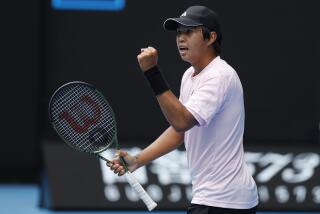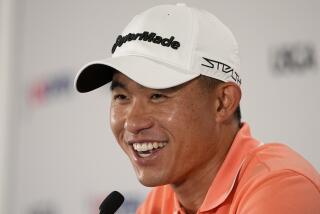He’s Near-Perfect Without Practice : Tennis: After a two-year hiatus, Malin hit around for four days, then won a prestigious national amateur event.
- Share via
Gene Malin made a grand exit from competitive tennis two years ago when he walked out of a national tournament.
Miffed at a tournament director and unhappy about the state of senior tennis, he stopped playing for national titles and essentially disappeared.
“I guess you could say I went underground,” Malin said.
But not quietly.
The night before he was scheduled to play a semifinal match in the U.S. Tennis Assn.’s Men’s 40 and over grass court championships at Montecito Country Club, Malin tossed his equipment into the trunk of his car and drove home. The tournament director pleaded with him not to default, especially so close to a championship. But after a terse conversation Malin drove off, never to be heard from again.
Until Sunday, when Malin re-emerged and scored a rousing double victory in the USTA National 45 Hard Court tournament at Westlake Tennis & Swim Club. Malin, who lives in Woodland Hills and turns 45 in December, won championships in both singles and doubles, looking as if not a day had passed since his 1991 walkout.
“I started practicing for the tournament the week before,” he said. “I hit the ball machine and practiced with a guy four days. That’s all.”
For two years Malin fiddled around, playing a recreational tournament here and there, and spent most of his time coaching the game he played professionally for eight years. He stayed away from regional, state and national competition, mainly because he was dissatisfied with the treatment of senior players.
But his competitive fuse remained lit. And when Malin came out blazing at Westlake last week and didn’t stop until he had torched 178 other players, not everyone was surprised. Tournament officials seeded him fifth.
Nobody in Southern California tennis had forgotten about Malin, who is known for his moderate success on the pro tour from 1974-82, his No. 1 ranking by the USTA in 35-and-over singles nine years ago, and his outspokenness about senior events.
And now that Malin is playing again, he’s talking again.
Malin says the USTA is ignoring amateur tennis while it could be generating more participation and higher-quality play by creating major age-group tournaments for adults and using its “huge” bank account to post large cash prizes.
“I understand that the USTA has over $140 million in its coffers,” he said. “Since it’s a nonprofit organization, why don’t they put $1 million into prize money to help fund senior tournaments? Instead of winning a couple hundred dollars for a national, make it, say, $10,000. That wouldn’t be too outrageous.”
Malin paid $100 ($50 for singles, $50 for doubles) to enter the hard courts, which drew entrants from across the country. He defeated Cliff Price of Tulsa, Okla., 7-6, 4-6, 6-3, in the singles final Sunday. Then he and Erick Baer of Thousand Oaks beat seventh-seeded Dick Johnson of Springfield, Mo., and Gerry Perry of St. Louis, Mo., 6-2, 7-5, in the doubles final.
Malin earned $200 for winning both championships.
Unlike many of the old superstars, who pursued business opportunities outside tennis, Malin added, many fringe pros such as he have turned to coaching. And because they spend so much time on the court, the old underdogs might be better today.
“I hit the ball better now--technically--than I did on the tour,” he said. “I had no coach, no trainer when I played on the tour. I did it with athleticism. But I’ve learned so much more about the game by coaching it.”
Malin is not alone in his thinking. There are seniors in his corner now wishing for a second chance at stardom.
“Gene had all the trappings of a national champion last weekend,” said Jim Rombeau, who lost to Malin in both singles and doubles at the hard courts. “It’s a shame a guy like that can’t have the opportunity to face better players.”
*
Rombeau, who played at North Hollywood High and defeated Malin of Grant for the 1966 City Section singles championship, has made similar rumblings in Houston--where he teaches and plays at the Houston Country Club.
Malin enjoyed his share of highlights on the pro tour.
His career was marked by victories over John Newcombe and Dick Stockton. Twice he defeated Ramish Krishman, the No. 1 player from India. He toppled Italian Andriano Panatta, the 1976 French Open champion, in the Cleveland Grand Prix in 1979.
Malin lost to Ilie Nastase in the semifinals of that tournament, his best as a pro.
In 1980, Malin’s serve was timed at 128 m.p.h., third-fastest in a contest at the Jack Kramer Indoor Open at Pauley Pavilion. He and John Lloyd reached the semifinals of that tournament in doubles. Malin also spent part of the year playing doubles with Vince van Patten. He and Bill Maze were semifinalists in the Tulsa Grand Prix, where Malin and Price first met.
Lengthy breaks from top-flight competition are not unusual for Malin, who said he devoted most of his time to coaching before appearing then disappearing at the 1991 national grass court tournament.
In 1987, with the help of professional Vijay Amritraj of India, Malin was hired to coach India’s Davis Cup team. India defeated both Israel and Australia, 5-0, and advanced to the final before losing to Sweden, which was led by Stefan Edberg and Mats Wilander.
Amritraj, who lives in Encino, was sold on Malin’s coaching ability and made Malin his hitting partner. Malin now gives private lessons to Prakash Amritraj, Vijay’s 10-year-old son.
Malin actually came much closer to the national spotlight as a coach than a player.
For brief periods, he coached Bonnie Gadusek and Barbara Potter. Both were ranked among the top 16 women in the world. But his prize pupil for 4 1/2 years was Stephanie Rehe of San Bernardino, who was ranked 10th in both singles (1988) and doubles (1992).
But an accident derailed Rehe’s budding career as a singles player during a Virginia Slims tournament in Chicago in 1988. Malin, Rehe and three others were in a rented car headed for their hotel when a motorist ran a red light and hit them broadside.
Rehe suffered the worst injuries--two herniated discs, which required surgery.
“She was supposed to play Chris Evert the next night,” Malin said. “I think the accident killed her career. She was ready to break into the top five. After that, every time she had a twinge it would affect her. She never really got over it.”
Shortly after Rehe attempted her comeback in 1990, Malin contemplated his own return. He entered the grass-court event in Montecito with the best intentions. But pride and principle got in the way. And before walking out, Malin criticized the tournament staff for not offering prizes and reduced rates on lodging and providing “terrible grass conditions” on the courts.
“I asked (the director) if there was any money involved in the tournament,” said Malin, explaining that he had grown weary of not cashing in on his talent. “He said no. That’s all I needed to hear. The guy did absolutely nothing for the players.”
But for now, the playing bug has hit Malin again.
“I miss competition like crazy,” said Malin, who arrived in Westlake hungry, not rusty. “I went in expecting to win. I feel like I’m one of the best players in the country in my age group. At this level, nobody is going to blow me off the court.”
Among the casualties left by Malin was Rombeau, the man who beat Malin for the high school championship 27 years ago. He lost to Malin, 6-3, 6-4, in the quarterfinals.
“Gene may not have played tournaments the last two years, but I guarantee you he’s been playing,” Rombeau said. “He’s fit, he’s sharp and he’s very sound. And, most of all, he doesn’t get ruffled.”
More to Read
Go beyond the scoreboard
Get the latest on L.A.'s teams in the daily Sports Report newsletter.
You may occasionally receive promotional content from the Los Angeles Times.










